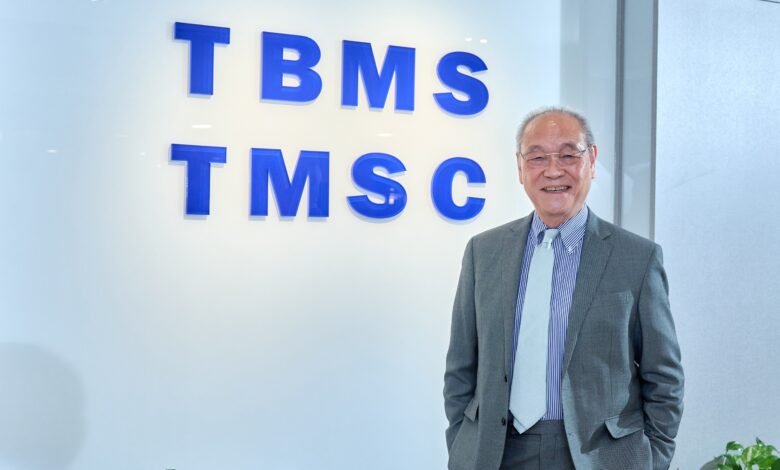Leading medical equipment distributor, TBMS embraces the ideal of “Confucian entrepreneurship for the society” to ensure the perpetual legacy of the enterprise

As the generation creating Taiwan’s economic miracle in the 1970s approaches retirement after nearly six decades of relentless efforts, the tide of “corporate succession” is nearing. While tradition once dictated that successors be direct descendants, a new trend of passing the business to capable leaders rather than descendants has emerged. According to a recent survey by a human resources firm, 52.7% of enterprises now opt for professional executives to take the reins. One exemplary case is TBMS, renowned domestically for its importation of medical devices and equipment.
In 1985, TBMS was founded by Chairman Moses Teng from scratch. Upon returning to Taiwan from the United States, Moses seized the opportunity of Taiwan’s economic boom that contributed to a significant rise in the standard of living and consumer purchasing power of Taiwanese people. Despite the government’s proactive efforts in establishing a robust healthcare system and a national medical information network, there was still ample room for improvement in overall medical service quality. It was then that Moses made the bold decision to venture into the healthcare industry, dedicating himself to introducing globally advanced medical devices and equipment.
Beacon of unwavering commitment to excellence: TBMS serves as a bridge, showcasing the spirit of Confucian entrepreneurship for the society.
Measured by financial statements and business scale, TBMS stands as a testament to entrepreneurial success. With over 200 employees, the company achieves an impressive annual sales growth of 20%. Its operational scope has expanded to six business divisions, representing over 40 reputable medical equipment brands with over 300 varieties of product lines. In addition to the pursuit of corporate profitability and profit-sharing among employees, TBMS’s nearly four-decade journey is defined by its steadfast adherence to the spirit of “Confucian entrepreneurship for the society”.
The concept of “Confucian entrepreneurship for the society” embodies a heartfelt commitment to improving society and making the world a better place through meaningful engagement. Despite being a seasoned entrepreneur in the business arena, why did Moses choose to embrace the ideal? He explains,
The products we deal with are all closely related to life itself. The essence of the healthcare industry, unlike other consumer markets, gives us a profound appreciation for life. Our company’s operation is not solely about pursuing profits; we also aim to instill our colleagues with deeper reflections on their work and lives through the influence of Confucianism. By fostering self-awareness, we seek to inspire a sense of mission to serve life.
Photo Credit:TNL Brand Studio
In addition to infusing the belief of Confucian entrepreneurship into its corporate culture, TBMS has extended this spirit to external partners in recent years. Through active collaboration with domestic medical equipment manufacturers and biotech companies, TBMS pushes forward mutual benefit and shared success throughout the industry chain. This strategic shift stems from Moses’s early entrepreneurial challenges. After the company solidifies its foundation, Moses seeks to leverage his influence to help more Taiwanese medical equipment manufacturers expand internationally.
Moses said, “With the advancement of healthcare and biotechnology industry in Taiwan, TBMS aims to serve as a conduit for bringing cutting-edge medical resources from around the world into Taiwan’s medical community. Also, we strive to assist capable Taiwanese companies in expanding overseas and securing their place on the international stage”.
As Taiwan prepares to enter a super-aged society by 2025, with one in every five individuals being elderly, TBMS finds its greatest advantage from its professional expertise of ensuring everyone has the opportunity to age gracefully. Drawing inspiration from Japan’s experiences, Shu-Li Huang, General Manager of TBMS’s Surgical Channel Division cites the example of idiopathic normal pressure hydrocephalus (iNPH), also known as a treatable and reversible form of dementia prevalent among the elderly population. Symptoms such as unsteady gait, urinary incontinence and declining memory are often misdiagnosed as Alzheimer’s or Parkinson’s disease, leading to missed treatment opportunities.
In response, TBMS has launched a three-year initiative to raise awareness of iNPH through collaboration with medical professionals, associations, and interdisciplinary teams. By ensuring timely and accurate diagnosis and providing appropriate medical interventions, the goal is to help patients return to normal life patterns and reduce overall societal caregiving costs.
The company’s mission of “serving for life” has also become a driving force in active response to ESG sustainability trends: constructing a corporate governance paradigm featuring “virtuous profit through Confucian entrepreneurship”. By harnessing the collective power of external stakeholders such as physicians, charity groups, suppliers, the company aims to promote widespread medical knowledge, enhance healthcare quality and patient-doctor relationships, as well as alleviate the workload of healthcare professionals. Furthermore, TBMS is dedicated to cultivating a diverse, inclusive, and harmonious workplace, providing employees with comprehensive resources and opportunities for learning and growth.
Using the “co-governance” model to cultivate the successor team and implementing the “Living Water Plan” to effectively retain talent.
Warren Buffett once noted, “By definition, a great company is one that’s going to remain its competitive advantage for 25 to 30 years”. Following the philosophy of passing the business to capable leaders rather than descendants, TBMS ensures the continuation of its corporate legacy. Moses further explains, “Passing on to virtuous and capable individuals is about continuing to give back to society, forming a model of sustainable governance. Some may question if it’s easy to entrust the company to outsiders. I believe that it’s precisely because we can’t bear to see the end of the company that we must find ways to ensure its sustainable operation”.
As for the substantive approaches, Moses emphasizes the cultivation of employees with a focus on “skills and virtue”. “Skills” represent expertise in the professional field, while “virtue” underscores the importance of ethical conduct and integrity. Currently, TBMS has established an Operation Management Committee, operating under a “co-governance” model to achieve complementary and balanced collective decision-making. Furthermore, the organization promotes financial transparency between departments, reinforcing accountability within each business division. Besides fostering healthy competition, the primary goal is to enable employees to “share” the fruits of the company’s success.

Photo Credit:TNL Brand Studio
TBMS is not only committed to implementing its “co-governance” and “sharing” system internally but is also eager to share its concrete strategies with external organizations. For instance, through workshops and focus group discussions with the Bliss & Wisdom Foundation of Culture and Education, TBMS proactively shares its business philosophy and corporate culture with other small and medium-sized business owners, fostering a cycle of goodness.
In addition to developing mid-to-senior-level management, TBMS prioritizes nurturing and retaining talent within its workforce, as exemplified by Moses’s creation of the “Living Water Plan.” This plan includes stock incentives and stock subscription subsidies. The former rewards key talent based on their annual performance, while the latter allows employees with more than three years of employment to subscribe to company stocks, with a proportional subsidies provided by the company.
Moses adds, “Currently, our employee shareholding stands at 13%, with a projected increase to 20% within three years. Our ultimate goal is for employees to enjoy 40% of the shareholding benefits. In a recent survey of mid-level managers, nearly two-thirds expressed that the Living Water Plan is one of the most impactful company policies, aiming to strengthen employees’ morale and cohesion”.
When aligning TBMS’s operational years with the human growth timeline, it falls in the stage of a young adult, characterized by peak physical and mental prowess. Strategically, the company is positioned to become a centennial enterprise. To achieve this, TBMS is implementing several initiatives: firstly, the continuous integration of digital tools to enhance organizational workflows and decision-making efficiency; secondly, fostering internal entrepreneurship opportunities to encourage employees to collaborate in creating new ventures, enabling this collective effort to become a magnificent driving force for TBMS’s sustained growth, progress, and long-term sustainability.



